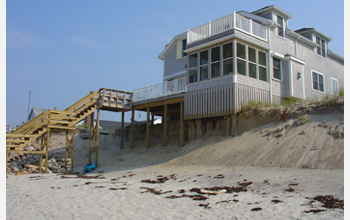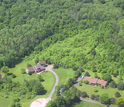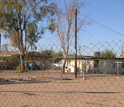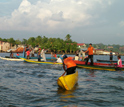|

Press Release 08-173
NSF Awards 10 Grants for Studies of Coupled Natural and Human Systems

Future of coastal barrier islands; tree growth in changing agricultural areas; urban vulnerability to climate change among research projects
October 3, 2008
To better understand the interactions between humans and their environment, the National Science Foundation (NSF) and the U.S. Forest Service have awarded 10 grants to scientists, engineers and educators across the country to study coupled natural and human systems. Research conducted through NSF's Dynamics of Coupled Natural and Human Systems (CNH) Program, in its second year as a multi-directorate NSF program, will provide a better understanding of natural processes and cycles, human behavior and decisions and how they interact. The CNH program is supported by NSF's directorates for biological sciences, geosciences and social, behavioral amd economic sciences. This year's awards will address topics including the uncertain future of coastal barrier islands, urban areas and their vulnerability to climate change, tree growth and carbon cycling in agricultural areas changing to residential areas, and how best to integrate industrial ecology and ecological engineering. "Several of these awards will investigate how climate change will impact human and natural systems, and how these coupled systems may respond adaptively," said James Collins, NSF assistant director for biological sciences. "The awards highlight the relevance and interdisciplinary nature of the CNH program in NSF's portfolio of investments in climate change research." "The CNH program has been successful in building new bridges connecting several of NSF's directorates, including the geosciences directorate," said Timothy Killeen, NSF assistant director for geosciences. "Pioneering work in this program is leading to a better understanding of the relationship between humankind and the complex environmental and biological systems that support life. Such studies will become more important as awareness grows of the finite limitations of our planet's resources, and of the extent of human interactions and interventions with the earth system." "Studying coupled human and natural environmental systems shows new, complex patterns that the natural and human sciences don't reveal when they function separately," said David Lightfoot, NSF assistant director for social, behavioral and economic sciences. "Research on environmental change, in terms of human causes and consequences, is a new kind of complexity science that has yielded interesting interactions." This year's grantees will study: - The drowning of developed coastal barrier islands, investigating the threshold rates of sea-level rise on the geologic-human system (Andrew Ashton, Woods Hole Oceanographic Institution)
- How best to integrate industrial ecology and ecological engineering (Bhavik Bakshi, Ohio State University)
- Spatial land-use change and ecological effects: how land management and carbon dynamics interact (Daniel Brown, University of Michigan at Ann Arbor)
- Urban vulnerability to climate change (Sharon Harlan, Arizona State University)
- Grassland dynamics in the Tibetan highlands: livestock, wildlife, and the culture and political economy of pastoralism (Richard Harris, University of Montana)
- Interactions of climate change, land management policies, and forest succession on fire hazards and ecosystems in the interface between wildlands and urban areas (Bart Johnson, University of Oregon at Eugene)
- Pueblo ecodynamics over long periods (Timothy Kohler, Washington State University)
- Globalization and the connection of remote communities, and its environmental implications (Daniel Kramer, Michigan State University)
- Developing an international network of research on coupled human and natural systems (Jianguo Liu, Michigan State University)
- Modeling of ecosystem services, incentive-based policies, land-use decisions, and ecological outcomes (Stephen Polasky, University of Minnesota)
-NSF-

Media Contacts
Cheryl Dybas, NSF (703) 292-7734 cdybas@nsf.gov

The National Science Foundation (NSF) is an independent federal agency that
supports fundamental research and education across all fields of science and
engineering, with an annual budget of $6.06 billion. NSF funds reach all 50
states through grants to over 1,900 universities and institutions. Each year,
NSF receives about 45,000 competitive requests for funding, and makes over
11,500 new funding awards. NSF also awards over $400 million in
professional and service contracts yearly.
 Get News Updates by Email Get News Updates by Email
Useful NSF Web Sites:
NSF Home Page: http://www.nsf.gov
NSF News: http://www.nsf.gov/news/
For the News Media: http://www.nsf.gov/news/newsroom.jsp
Science and Engineering Statistics: http://www.nsf.gov/statistics/
Awards Searches: http://www.nsf.gov/awardsearch/
| 





